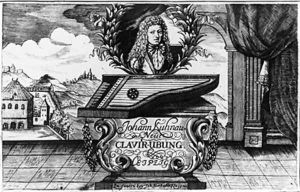Johann Kuhnau Paintings
Johann Kuhnau was a German Baroque composer, organist, and music theorist who served as the predecessor to Johann Sebastian Bach as Cantor of the Thomasschule at St. Thomas Church in Leipzig. Born on April 6, 1660, in Geising, Saxony, Kuhnau was a multitalented individual, also known for his work as a translator and for his legal studies, which earned him a title of Doctor of Law.
Kuhnau was a highly educated individual, having attended the Kreuzschule in Dresden, where he studied music and languages. He was a proficient polyglot, fluent in at least seven languages. His musical career began at an early age; by the time he was ten, he was already composing and sometimes even filling in for his music teacher at his school. He later moved to Zittau, where he continued his education, and then to Leipzig in 1682 to study law at the university.
While in Leipzig, Kuhnau became deeply involved in the city's rich musical life. In 1684, he was appointed organist at the Thomaskirche, and in 1701, he became the Cantor of the Thomasschule, a prestigious position that involved overseeing the music at the four main churches of the city, educating students, and composing music for regular church services and special occasions. Kuhnau held this position until his death, and his tenure was marked by significant contributions to sacred music, including cantatas and keyboard music.
Kuhnau's compositions, though not as widely known today as those of his successor Bach, were innovative for their time and show a mastery of counterpoint and an early exploration of programmatic elements in instrumental music. His keyboard music, which includes the collection 'Musicalische Vorstellung einiger biblischer Historien' (Musical Depiction of Several Biblical Stories), was particularly notable for its programmatic qualities, telling stories from the Bible through instrumental means. This collection was one of the first known examples of program music and had an influence on later composers, including Bach.
In addition to his musical achievements, Kuhnau published several theoretical and critical works. He was an advocate for the emotional and expressive potential of music, which was a relatively modern view during the late 17th and early 18th centuries.
Johann Kuhnau died on June 5, 1722, in Leipzig. His legacy as a composer, although overshadowed by his illustrious successor, is nonetheless important for its contributions to the development of keyboard music and the early use of programmatic elements. His works continue to be studied and performed, offering a window into the transitional period between the Baroque and the early Classical era in music.
